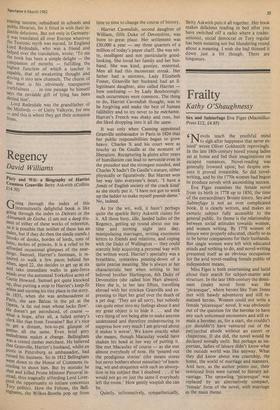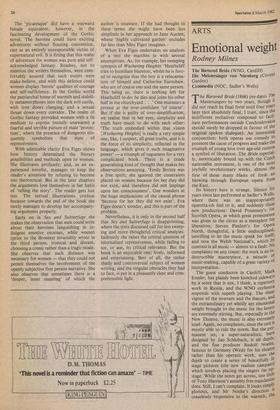Frailty
Kathy O'Shaughnessy
Novels teach the youthful mind 1 NI to sigh after happiness that never ex- isted° wrote Oliver Goldsmith reprovingly. In the late 18th-century bored young ladies sat at home and fed their imaginations on escapist romances. Novel-reading was generally frowned upon; but despite cen- sure it proved irresistible. So did novel- writing, and by the 1770s women had begun to produce novels with astonishing success.
Eva Figes examines the female novel from its birth in 1778 up to 1850, the time of the extraordinary Bronte sisters. Sex and Subterfuge is not an over complicated book. It is clearly written, and makes an esoteric subject fully accessible to the general public. Its theme is the relationship between social attitudes towards women, and women writing. By 1778 women of leisure were properly educated, chiefly so as to be better companions for their husbands. But single women were left with educated minds and nothing to do, and novel-writing presented itself as an obvious occupation for the avid novel-reading female public of independent means.
Miss Figes is both entertaining and lucid about their search for subject-matter and structure. In the late 18th-century the domi- nant (male) novel form was the `picaresque', where heroes like Tom Jones met with bawdy adventures and still re- mained heroes. Women could not write a female `picaresque' novel. It was obviously out of the question for the heroine to have any such unlicensed encounters and still re- main a heroine; as, for a start, she couldn't (or shouldn't) have ventured out of the patriarchal abode without an escort or chaperone. If she did, the novel would be declared morally unfit. But perhaps as im- portant, ladies of leisure didn't know what the outside world was like anyway. What they did know about was courtship, the home, the world of marriage and manners, And here, as the author points out, their restricted lives were turned to literary ad- vantage. The sprawling `picaresque' was replaced by an alternatively compact, `female' form of the novel, with marriage as the main theme.
The 'picaresque' did have a wayward female equivalent, however, in the fascinating development of the Gothic novel. The heroine could have exciting adventures without flouting convention, cast as an entirely unresponsible victim of supernatural evil. It is fitting that this realm of adventure for women was pure and self- acknowledged fantasy. Readers, not to mention the writers themselves, were com- fortably assured that such events were make-believe, and with this defence could women display 'heroic' qualities of courage and self-sufficiency. In the Gothic world the patriarchal home of warmth and stabili- ty metamorphoses into the dark evil castle, with iron doors clanging, and a sexual threat down every corridor. The realm of Gothic fantasy provided women with a fit medium to express (mostly unawares) a fearful and terrible picture of male 'protec- tion', where the presence of dungeons elo- quently symbolises that state of repressiveness.
With admirable clarity Eva Figes shows how history determined the literary possibilities and methods open to women. She illustrates profusely; and, as an ex- perienced novelist, manages to keep the reader's attention by refusing to become too theorectical. But in the later chapters the arguments lose themselves in her habit of 'telling the story'. The reader gets lost too. The textual illustrations confuse because towards the end of the book she rarely manages to develop her accompany- ing arguments properly.
Early on in Sex and Subterfuge she makes the observation that men could write about their heroines languishing in in- dulgent emotive excesses, while women (prior to the Brontes) invariably wrote in the third person, ironical and distant, choosing a comic rather than a tragic mode. She observes that such distance was necessary for women — that they could not permit themselves the involvement of the openly subjective first person narrative. She also observes that sometimes there is a 'deeper, inner meaning' of which the
author is unaware. If she had thought in these terms she might have been less simplistic in her approach to Jane Austen, whose 'highly cultivated garden' excludes far less than Miss Figes imagines.
When Eva Figes undertakes an analysis of a text she marches in with several assumptions. As, for example, her sweeping synopsis of Wuthering Heights: 'Heathcliff tries to humiliate Hareton, whilst he is forc- ed to recognise that the boy is a reincarna- tion of himself and Catherine Earnshaw, who are of course one and the same person. This being so, there is nothing left for Heathcliff to do: he dies and joins his other half in the churchyard . . .' One murmurs a protest at the over-confident 'of course'. But if she is guilty of over-simplification, we realise that in her eyes, simplicity and truth have much to do with each other: `The truth embodied within that vision [Wuthering Heights] is really a very simple one, like, I suspect, all great truths, and it is the force of its simplicity, reflected in the language, which gives it such imaginative power' — a triumph of vagueness for a very complicated book. There is a crude generalising kind of thought that makes her observations annoying. 'Emily Bronte was a free spirit; she ignored the constraints placed on women because for her they did not exist, and therefore did not impinge upon her consciousness'. One wonders at the huge implications of the casual phrase `because for her they did not exist'. Eva Figes doesn't wonder, and this is part of the problem.
Nevertheless, it is only in the second half that Sex and Subterfuge is disappointing, where the texts discussed call for less sweep- ing and more thoughtful critical analyses. Indirectly she raises the central question of internalised repressiveness, while failing to see, or use, its critical relevance. But the book is an enjoyable one; lively, informed and entertaining. Best of all, the rather shady and controversial subject of women writing, and the singular obstacles they had to face, is put in a pleasantly clear and com- prehensible light.







































 Previous page
Previous page